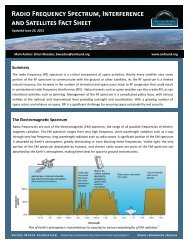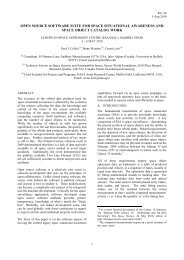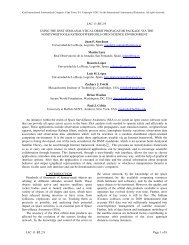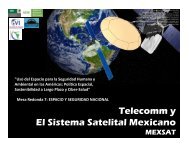Space Security Index
Space Security Index
Space Security Index
Create successful ePaper yourself
Turn your PDF publications into a flip-book with our unique Google optimized e-Paper software.
of the rst two space tourists purchased policies for training, transportation, and time spent<br />
in space. 71<br />
2010 Development<br />
Two new services bring high-speed Internet to underserved markets<br />
With pockets of Europe and the Mediterranean still lagging behind the digital age in terms<br />
of Internet connectivity, in 2010, two companies launched satellites with new technology<br />
capable of providing broadband via satellite. 72 On 26 November, Avanti Communications,<br />
a startup U.K. company, launched the rst European spacecraft dedicated to providing<br />
broadband Internet access via satellite. 73 With the $159-million satellite, the company plans<br />
to serve Europe, the Middle East, and Africa and hopes for a base of up to 1.2 million<br />
customers. 74<br />
Between mid-November and late December, Eutelsat launched three satellites to provide<br />
broadband service to Europe, the Mediterranean, and North America. 75 e third of these,<br />
a $475-million satellite primarily targeting the European market, is larger than Avanti’s and<br />
is capable of providing broadband to two million homes. Although already available in the<br />
U.S., the new services are the rst outside that market to operate on a new transmission<br />
frequency providing true broadband speeds. 76 e satellite, called Ka-Sat, will provide ample<br />
coverage for Europe with 80 spot beams, which allow for frequencies to be reused in various<br />
regions without interference, resulting in increased capacity. 77 Both Avanti and Eutelsat plan<br />
to market through Internet providers rather than directly to end-users. 78<br />
Figure 5.3: Worldwide satellite industry revenue by sector (2010) 79<br />
A related new enterprise is Google’s initiative to bring high-speed Internet to remote areas<br />
of the developing world by promoting e ective FCC management of spectrum resources<br />
and comprehensive review of competition rules. 80 e company put out its Request for<br />
Information in February to help identify interested communities. 81 Google is planning to<br />
build and test ultra-high speed broadband networks in a small number of trial locations<br />
across the U.S. It hopes to transmit data at Internet speeds more than 100 times faster than<br />
what most Americans have access to today with 1 gigabit per second, ber-to-the-home<br />
connections, and to o er service at a competitive price to at least 50,000 and potentially up<br />
to 500,000 people. 82<br />
Commercial <strong>Space</strong><br />
105

















